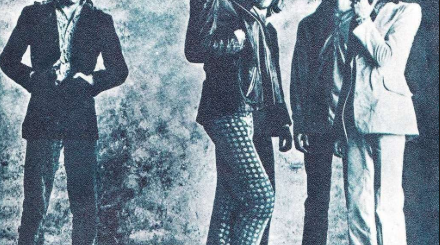Sweet Black Angel by The Rolling Stones Lyrics Meaning – Unraveling the Anthem of Liberation
Lyrics
Got a pin up girl
Got a sweet black angel
Up upon my wall
Well, she ain’t no singer
And she ain’t no star
But she sure talk good
And she move so fast
But the gal in danger
Yeah, de gal in chains
But she keep on pushin’
Would ya take her place?
She countin’ up de minutes
Countin’ up de days
She’s a sweet black angel, whoa
Not a sweet black slave
Ten little niggers
Sittin’ on de wall
Her brothers been a fallin’
Fallin’ one by one
For a judge they murdered
And a judge they stole
Now de judge he gonna judge her
For all dat he’s a worth
Well de gal in danger
De gal in chains
And she keep on pushin’
Would you do the same?
She countin’ up de minutes
She countin’ up de days
She’s a sweet black angel
Not a gun toting teacher
Not a Red lovin’ school mom
Ain’t someone gonna free her
Free de sweet black slave
Free de sweet black slave
Free de sweet black slave
Free de sweet black slave
In 1972, The Rolling Stones released ‘Sweet Black Angel,’ a song that, despite its seemingly simple facade, became a potent symbol of the era’s social movements. Not just a track from their acclaimed album ‘Exile on Main St.,’ this song carried a narrative weight that extended far beyond the album’s bluesy rock ‘n’ roll tunes.
Over the years, the ballad has been dissected and discussed by music aficionados and historians alike. Its enigmatic lyrics, which speak of oppression, resilience, and the quest for freedom, continue to resonate as they echo the tumultuous period of the 1960s’ civil rights struggles. In this lyrical deep dive, we unpack the layers of ‘Sweet Black Angel’ to reveal the enduring power of its story.
An Ode to the Feminine Force of the Civil Rights Movement
The title ‘Sweet Black Angel’ itself is a nod to the strength and courage of black women within the civil rights context. The object of the Stones’ attention is no demure figure; she is a dynamic force ‘up upon my wall,’ symbolizing a moral beacon and a spiritual guide. Her representation as a ‘pin up girl’ contrasts sharply with the usual connotation, challenging and reinventing the imagery typically associated with women in media.
Although not explicitly named in the song, it’s widely accepted that the ‘angel’ in question refers to civil rights activist Angela Davis, who, during the song’s writing, faced imprisonment. This thinly-veiled tribute celebrates not just Davis but the multitude of women whose behind-the-scenes activism fueled the fight for racial equality.
Challenging Stereotypes: The Angel’s True Identity
The Rolling Stones bluntly dismiss any superficial recognition of the ‘sweet black angel.’ They clarify, ‘Well, she ain’t no singer / And she ain’t no star,’ thereby deflecting common stereotypes often affixed to black women in popular culture. The emphasis here shifts from traditional fame to the substantive qualities of communication (‘she sure talk good’) and speed, which in this context, can be interpreted as intellectual quickness and the efficiency of mobilization.
By casting the ‘sweet black angel’ as the opposite of an entertainer or a celebrity, The Rolling Stones redirect the spotlight onto women who make significant but often unrecognized contributions to social change. The deliberate contrast seeks to capture the spirit of those who labor in danger and in chains, underscoring a larger narrative about unsung heroes.
The Resilience Amidst Struggle: Counting Up the Days
The recurring mention of time—’countin’ up de minutes / Countin’ up de days’—alludes to the grueling endurance required of those fighting for justice within the oppressive confines of an unjust system. These lines resonate with the patience and the inexorable march toward freedom. It’s not just about marking the passage of time, but about the relentless pursuit of liberation.
The Stones, through their recounting of perseverance, construct an image of the ‘sweet black angel’ as a figure of staunch determination. In doing so, they encapsulate the essence of the civil rights movement, characterized by the counting of years and generations longing for the end of racial discrimination and inequality.
A Grim Reflection of Racial Injustice: ‘Ten Little Niggers’
Perhaps one of the most jarring lines of ‘Sweet Black Angel’ is the verse that begins with ‘Ten little niggers.’ Derived from a children’s rhyme that is now rightly condemned for its offensive language, The Rolling Stones repurpose the term to highlight the deadly racism that was an everyday reality for black individuals. The falling ‘one by one’ serves as a grim reminder of the lives lost to racial violence.
This part of the song speaks to the tragic normality of such violence in American society and the judicial system’s role in perpetuating racism. The criticism is pointed and powerfully uncomfortable, as it invokes the language that has historically been used to dehumanize black people, here recontextualized to condemn systemic injustice.
Unveiling the Song’s Hidden Meaning: A Clarion Call for Freedom
The repetition of ‘Free de sweet black slave’ at the song’s conclusion is a poignant and direct demand for emancipation, not only from physical incarceration but also from the metaphorical chains of systemic oppression. ‘Sweet Black Angel’ blossoms from a bluesy homage into an anthem of liberation, a musical expression of solidarity with the marginalized and the oppressed.
In its calls to action, ‘Sweet Black Angel’ vibrates with the heartbeat of the civil rights movement, echoing through the décades as a stark reminder that the struggles they documented are by no means relegated to the past. The song stands as a resonant encouragement to continue to strive for justice—a reminder to keep pushing, much like the ‘sweet black angel’ herself.








